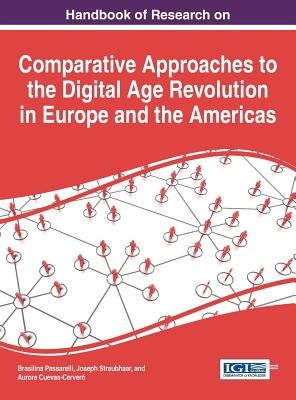
- We will send in 10–14 business days.
- Publisher: Information Science Reference
- ISBN-10: 1466687401
- ISBN-13: 9781466687400
- Format: 21.6 x 27.9 x 3.2 cm, hardcover
- Language: English
- SAVE -10% with code: EXTRA
Handbook of Research on Comparative Approaches to the Digital Age Revolution in Europe and the Americas (e-book) (used book) | bookbook.eu
Reviews
Description
The way we talk, work, learn, and think has been greatly shaped by modern technology. These lifestyle changes have made digital literacy the new written literacy, where those who are not able to use computers are unable to function and perform everyday tasks. The Handbook of Research on Comparative Approaches to the Digital Age Revolution in Europe and the Americas explores the new ways that technology is shaping our society and the advances it is bringing, along with potential drawbacks, such as human jobs being replaced by computers. This expansive handbook is an essential reference source for students, academics, and professionals in the fields of communication, information technology, sociology, social policy, and education; it will also prove of interest to policymakers, funding-agencies, and digital inclusion program developers. This handbook features a broad scope of research-based articles on topics including, but not limited to, computational thinking, e-portfolios, e-citizenship, digital inclusion policies, and information literacy as a form of community empowerment.
EXTRA 10 % discount with code: EXTRA
The promotion ends in 18d.12:42:05
The discount code is valid when purchasing from 10 €. Discounts do not stack.
- Publisher: Information Science Reference
- ISBN-10: 1466687401
- ISBN-13: 9781466687400
- Format: 21.6 x 27.9 x 3.2 cm, hardcover
- Language: English English
The way we talk, work, learn, and think has been greatly shaped by modern technology. These lifestyle changes have made digital literacy the new written literacy, where those who are not able to use computers are unable to function and perform everyday tasks. The Handbook of Research on Comparative Approaches to the Digital Age Revolution in Europe and the Americas explores the new ways that technology is shaping our society and the advances it is bringing, along with potential drawbacks, such as human jobs being replaced by computers. This expansive handbook is an essential reference source for students, academics, and professionals in the fields of communication, information technology, sociology, social policy, and education; it will also prove of interest to policymakers, funding-agencies, and digital inclusion program developers. This handbook features a broad scope of research-based articles on topics including, but not limited to, computational thinking, e-portfolios, e-citizenship, digital inclusion policies, and information literacy as a form of community empowerment.


Reviews